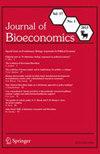证据真空、认识共同体与印度罕见病政策制定:进化政策视角
Q3 Social Sciences
引用次数: 0
摘要
本文章由计算机程序翻译,如有差异,请以英文原文为准。
Evidentiary vacuum, epistemic communities and rare disease policymaking in India: an evolutionary policy perspective
求助全文
通过发布文献求助,成功后即可免费获取论文全文。
去求助
来源期刊

Journal of Bioeconomics
Social Sciences-Geography, Planning and Development
CiteScore
3.70
自引率
0.00%
发文量
7
期刊介绍:
The Journal of Bioeconomics is devoted to creative interdisciplinary dialogues between biologists and economists. It promotes the mutual exchange of theories, methods, and data where biology can help explaining economic behavior and the nature of the human economy; and where economics is conducive to understanding the economy of nature. The Journal invites contributions relevant to the bioeconomic agenda from economic fields such as behavioral economics, biometric studies, neuroeconomics, consumer studies, ecological economics, evolutionary economics, evolutionary game theory, political economy, and ethnicity studies. From biology, the Journal welcomes contributions from, among others, evolutionary biology, systematic biology, behavioral ecology, ethology, paleobiology, and sociobiology. The scholarly discussion also covers selected topics from behavioral sciences, cognitive science, evolutionary anthropology, evolutionary psychology, epistemology, and ethics. Officially cited as: J Bioecon
 求助内容:
求助内容: 应助结果提醒方式:
应助结果提醒方式:


